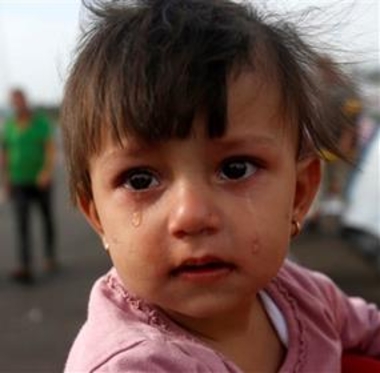Croatia now latest migrant hotspot after Hungarian clashes

Tovarnik, Croatia (AP) — Thousands of people are pouring into Croatia, turning that nation into the latest hotspot in the 1,000-mile plus exodus toward Western Europe after Hungary used tear gas, batons and water cannons to keep migrants out of its territory.
By Thursday morning, Croatian police said 6,200 people had entered the country since the first groups started arriving early Wednesday.
After bus trips through Serbia, the migrants crossed fields on foot to enter Croatia, where dozens of police directed them to trains and buses heading to refugee centers in Zagreb and elsewhere. Authorities had warned them to avoid walking in areas along the Serbian border that are still being demined from the country's 1991-95 war.
Croatian Interior Minister Ranko Ostojic said the country has the situation under control but warned that "if huge waves start coming through Serbia, we must consider different moves."
Croatia represents a longer and more arduous route into Europe for the asylum-seekers from Syria and elsewhere fleeing violence in their homelands. But they have little choice after Hungary sealed off its southern border with Serbia on Tuesday and began arresting anyone caught trying to enter the country illegally.
The migrants are unlikely to stay long in Croatia. Most plan to travel on, passing through Slovenia and then Austria en route to Germany or the Scandinavian countries. Croatian Foreign Minister Vesna Pusic said the country "cannot force anyone to stay."
Both Slovenia and Austria reinstated border checks in anticipation of the refugee wave — and Hungary warned that it would consider also building a wall on its border with Croatia.
Austrian Prime Minister Werner Faymann was holding talks Thursday in Zagreb, the Croatia capital, and Ljubljana, the Slovenian capital.
Clashes between migrants and Hungarian riot police broke out Wednesday afternoon after people frustrated at being blocked from the country pushed open a gate at the border with Serbia. Baton-wielding police responded with tear gas, pepper spray and water cannons, and migrants threw rocks and other objects at police. Dozens were injured.
Foreign Minister Peter Szijjarto lashed out Thursday against strong criticism the country has faced internationally — including from U.N. Secretary General Ban Ki-moon, who called Hungary's response unacceptable.
"I find it bizarre and shocking that certain esteemed international figures have stood on the side of people who for hours were throwing stones and pieces of cement at the Hungarian police," Szijjarto said. "And I'd also like to make it very clear, no matter what criticism I receive, that we will never allow such aggressive people to enter Hungary. Not even for transit purposes."
Hungarian police said they detained 22 people. Government spokesman Zoltan Kovacs said one was a Syrian man, "one of the organizers" of the attacks at Horgos, who is now suspected of "carrying out an act of terrorism."
On Thursday, the European Union's migration commissioner, Dimitris Avramopoulos, who declared that walls and violence are no solution and urged Hungary to work with the 28-nation bloc to alleviate the continent's migration crisis.
"The majority of people arriving in Europe are Syrians," Avramopoulos said at a news conference alongside Szijjarto in Budapest. "They are people in genuine need of our protection. There is no wall you would not climb, no sea you wouldn't cross if you are fleeing violence and terror. I believe we have a moral duty (to) offer them protection."
Hungary, in contrast, has been insisting that most at the border are simply economic migrants seeking better jobs. Prime Minister Viktor Orban has also said that by keeping out Muslims, Hungarian police are defending "Europe's Christian culture."
Avramopoulos countered that he considered it a "Christian duty" to handle the migration crisis with compassion.
Overnight, Hungarian authorities positioned barbed wire and a new gate at the border where the clashes occurred near the Serbian village of Horgos. Still, that did not deter everyone.
About 30 young Afghan men waited Thursday on the Serbian side for a chance to cross the razor-wire fence, although their chances appeared remote as Hungarian police officers were patrolling.
Zahed Chakari, an 18-year-old from Kabul, said his group was waiting for instructions from their smuggler on what to do or where to go next.
"We will stay here until we cross the border. There is no alternative," he said, adding that four women traveling with him had already been shot dead earlier by Iranian forces when the group crossed into Turkey.
Most of the asylum seekers, however, were giving up on entering Hungary, leaving by bus, taxi or on foot for Croatia. Some ironically chanted "Thank You, Hungary!" in the direction of the Hungarian border guards. Small groups also staged sit-in protests before the shut border gates where the clashes took place Wednesday.
In Paris, French authorities evacuated more than 500 Syrian and other migrants from tent camps and moved them into special housing as the country steps up its efforts to deal with Europe's migrant wave.
Social workers woke the migrants before dawn, and they gathered their belongings calmly, watched over by police. The operations took place at a large camp near the Gare d'Austerlitz train station in southeastern Paris, and another in the 18th arrondissement in northern Paris.
By Radul Radovanovi and Jovana Gec, Associated Press. Copyright 2015 The Associated Press. All rights reserved. This material may not be published, broadcast, rewritten or redistributed.
The Gayly – September 17, 2015 @ 8:10am.





